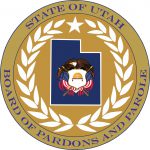Utah Board of Pardons & Parole
Types of Hearings Conducted
Search Hearings
Follow this link to search for hearings and decisions made by the Board of Pardons and Parole related to specific individuals.
Listen Live
When hearings are being conducted at either the Salt Lake City prison site (Utah State Correctional Facility) or the Gunnison site (Central Utah Correctional Facility), following this link will give you access to a live stream. Similarly, if a Pardon Hearing is being conducted, this link will give you access to watch and/or listen to a live stream of the hearing.

Original Hearing
Each inmate whose sentence carries the possibility of parole has the right to a personal appearance before the Board at some point during his or her sentence to determine whether a parole or other disposition short of sentence expiration will be granted. These Original Hearings are scheduled as follows:
In cases where a life has been taken, the Board will review each case and schedule the original hearing based upon the unique facts of the case. (Once an offender is committed to prison for such a conviction, the case will be reviewed by the Board as soon as practicable for a determination of the month and year for their original hearing. The Board will only consider information available to the court at the time of sentencing.)
For first degree felony convictions (where a life was not taken):
if the most severe sentence imposed is greater than fifteen years to life, the original hearing will be scheduled after the service of fifteen years;
if the most severe sentence imposed is a sentence of ten years to life, or fifteen years to life, the original hearing will be scheduled after the service of seven years; and
if the most severe sentence imposed is less than ten years to life, the original hearing will be scheduled after the service of three years.
For sex offenses, third degree felony convictions will be scheduled after the service of six months; and second degree felony convictions will be scheduled after the service of twelve months.
For all other offenses, original hearings are scheduled for third degree felony convictions after the service of three months; and for second degree felony convictions after the service of six months.
Parole Violation Hearing
When an offender is alleged to have violated the terms or conditions of the parole agreement, Adult Probation and Parole may request that the Board issue a warrant for the offender’s arrest and return to prison. If a reviewing Board Member finds that probable cause exists for the allegations, a warrant may be issued. After probable cause has been established, and the offender has been returned to custody, the offender has the right to be heard at a Parole Violation hearing, which is scheduled as soon as possible after a warrant is executed.
At the parole violation hearing, the offender has the right to offer pleas to the parole violation allegations. The Board provides an attorney for the offender during the parole violation process. Upon the entry of guilty or no contest pleas to the allegations, the hearing official may take testimony from the parole agent as well as the offender as to disposition. A summary of this hearing is then forwarded to the Board for consideration and decision.
Upon the entry of a not guilty plea, the parole violation allegations may be set for an Evidentiary Hearing, at which the offender can be represented by an attorney of choice at the offender’s expense, or by the attorney provided by the Board. The offender has a right to confront and cross examine witnesses, and the right to present rebuttal evidence. Following the evidentiary hearing, a summary of the hearing is forwarded to the Board for consideration and decision.

Rehearing
One possible decision of the Board at the original hearing can be to not grant a parole date, but rather, to schedule a date for an additional hearing. A rehearing is conducted in much the same way as the original hearing.
Redetermination
After the Board has made a decision in a case, when that decision is to grant a lengthy rehearing or a parole date in the future, there is a mechanism for review of such cases.
The Redetermination policy is as follows:
Offenders will be eligible to apply for redetermination at five-year intervals from the last time-related decision. A time-related decision is defined as a personal appearance hearing or redetermination review dealing with release or rehearing dates. Offenders who have been given a decision of natural life in prison will be eligible for redetermination at ten year intervals. Utah Administrative Code R671-316
Rescission
After the Board makes a decision to grant an inmate a release or a rehearing, that individual may, at any time, be referred to the Board for a review of that decision due to violations of prison regulations, new criminal convictions, or other issues. The outcome of a rescission hearing may be to postpone the previously set release or rehearing.
Special Attention
At any time during an offender’s incarceration or parole, the Board may review his/her case. This review may be the result of recommendations from prison caseworkers, parole agents, a request from the offender, or occasionally from an outside source. In any case, new information must be presented which has not been considered at the last review of the Board. This type of review can be either an administrative review of the file or a personal appearance hearing.
